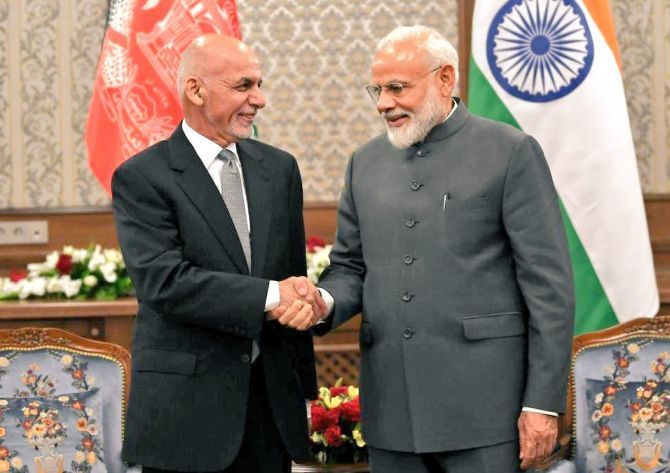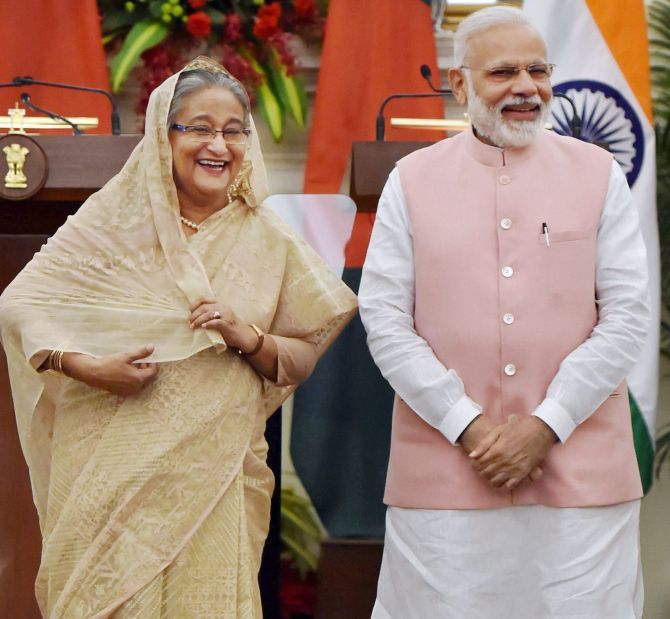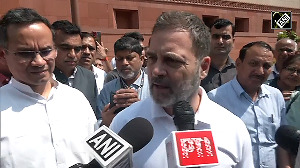Make no mistake, the Bangladeshi and Afghan missions in Chanakyapuri would report verbatim to their capitals the abrasive remarks attributed to the Indian leadership, casting a slur on their countries's political culture and national honour, warns Ambassador M K Bhadrakumar.

This had to happen: The friendliest and the closest neighbour that India ever had since its Independence, Afghanistan, has cast aside diplomatic niceties and unmistakably conveyed its indignation and sense of hurt over the churlish imputation by the Indian leadership of alleged religious/racial persecution of minorities in that Muslim country on India's northern tier.
The interview (external link) by the Afghan envoy Tahir Qadiry with India Today TV should come as an eyeopener for Prime Minister Narendra Damodardas Modi and Home Minister Amit Anilchandra Shah -- and even External Affairs Minister Subrahmanyam Jaishankar -- namely, that India's political relations with its three big 'Muslim neighbours' are running into headwinds.
The Afghan envoy has taken exception to the very notion of State persecution of the minority Sikh community in his country.
As he put it, 'In the last few years, since the fall of the Taliban Afghan people and government, especially this government, has been respecting the minorities, like the Sikh community, our great brothers and sisters as we have in Afghanistan. We have huge respect for them, we have seats for them in parliament, seats in the lower house as well, we also have their representative at the presidential palace.'
Qadiry's remarks constitute a truthful statement of facts.
Except for the abnormal five-year period under Taliban rule (1996-2001), the Afghan State has pursued a policy of pluralism allowing various faiths and sects to flourish.
The Sikh community was never persecuted in Afghanistan.
In fact, it was well-rooted in Afghan society and even in the chaotic times under the Mujahideen (1992-1996), the Sikh gurdwara in Kabul was an oasis of peace and serenity. I had a most memorable visit to the Kart-e-Parwan gurdwara in Kabul in 1994.
When security conditions deteriorated alarmingly in the nineties, many Sikh families moved down to India to wait out the time of troubles.
But the enterprising male members of the families mostly preferred to stay put in Kabul and pursue their livelihood, which was mostly trading.
In the Afghan setting, they did relatively well too, especially doing trade with India.
Of course, with the hydra-headed beast of terrorism around, insecurity prevails in Afghanistan today and the Sikh community has also grievously suffered.
But State repression? For God's sake, no.
Unlike the present Bharatiya Janata Party-led government's approach, successive Congress governments pursued an open door policy toward Afghan nationals who sought refuge in India.
We never differentiated the Afghans on the basis of their religion or ethnicity.
Indian policies were riveted on people-to-people relations and that approach earned a lot of goodwill for our country among Afghans in general.
Arguably, that approach proved to be the mainstay of the India-Afghanistan relationship.
Ironically, even Indian intelligence, which taps into Afghan goodwill rather lavishly in recent years, has been a direct beneficiary of the policy of friendship and the vast reservoir of friendly feelings it created through several decades.
How far Indian intelligence agencies tried to discourage Home Minister Shah from proceeding on such an abrasive track today we do not know, but it seems extremely unlikely that such professionalism exists any longer in our country.
As for the ministry of external affairs, the less said the better.
These are times when the MEA ought to have flagged to the Indian leadership that the fallouts of their anti-Muslim trajectory on the country's relations with Afghanistan and Bangladesh -- and, conceivably, even the Maldives despite its abject vulnerability to Indian pressure -- in the period ahead.
But, again, headed by a minister who is more loyal than the king himself, the MEA will prefer to remain a mute spectator.
Don't you think you can accuse your neighbours of intolerance and racial prejudice and persecution and get away with it.
It is not only that you don't throw stones from glass houses.
The point is, even small countries are entitled to self-esteem and national pride.
We have wounded the Afghan and Bangladeshi national psyche and self-respect and there is going to be a price to pay.
It is improbable that as long as the present ruling elite remain in power, there could be any genuine, sincere meeting of minds with India's Muslim neighbours who perceive us as a land of bigotry.
India could have and should have taken a different route to tackle its 'refugee problem.'
In a forceful editorial, the Financial Times wrote, 'If Mr Modi's government is serious about protecting immigrants, it should sign the UN's 1951 Refugee Convention -- which asserts refugees should not be returned to a country where they face serious threats to life or freedom, but to which India is not a party. If India wants to preserve its moral claim to influence as the world's largest democracy, moreover, it should avoid going down a path that could demote millions of long-term residents to second-class status -- or worse -- on the basis of religion.'

Make no mistake, the Bangladeshi and Afghan missions in Chanakyapuri would be reporting verbatim to their capitals the abrasive remarks attributed to the Indian leadership, casting a slur on their countries's political culture and national honour.
In a region where India already stands isolated today, why do we have to antagonise the two exceptional neighbours who have been singularly anxious and willing to work with us in a cooperative spirit? See below the remarks made by Qadiry himself as recently as in September, extolling Afghan-Indian ties.
How times have changed between September and today -- J&K in August and the stagnant economy, followed by the Ayodhya verdict and the Citizenship Bill!
Of course, in the pitiless world of diplomacy, we may estimate, these small countries such as Afghanistan that Qadiry represents have no option but to cooperate with the big donor country that is India.
But such hubris won't take us far in today's world.
If we are incapable of maintaining equal relationships based on respect, our smaller neighbours will look elsewhere in their environs for meaningful friendships, and in today's circumstances, they do not have to look far in their neighbourhood, do they? And when that happens -- as surely as night follows day -- we may have to 'sit on the ground and tell sad stories of the death of kings'.
Ambassador M K Bhadrakumar served the Indian Foreign Service officer for more than 29 years. He has served as India's ambassador to Turkey and Uzbekistan and has been a contributor to Rediff.com for well over a decade.
Please read his account of how he played a stellar role in beginning India's systemic dealings in Afghanistan in 1994.











 © 2025
© 2025